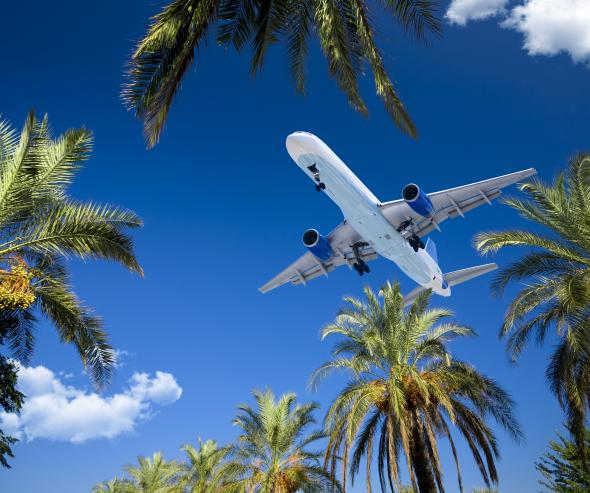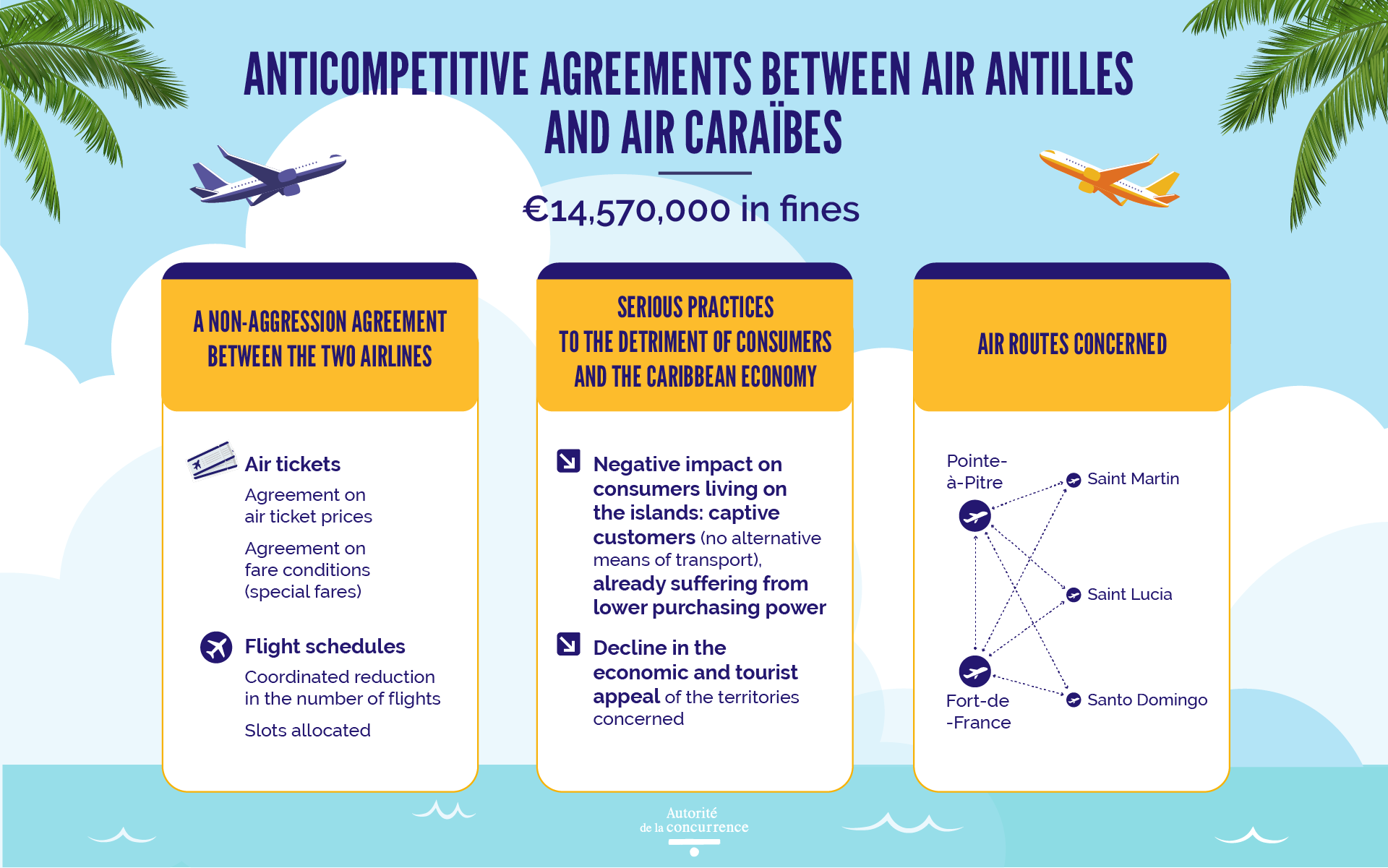Inter-island air transport in the Caribbean: the Autorité de la concurrence sanctions anticompetitive agreements between the airlines Air Antilles and Air Caraïbes

Background
Following an investigation opened at the initiative of the General Rapporteur and a series of dawn raids, the Autorité de la concurrence has imposed fines of €14,570,000 on two airlines operating in the inter-island passenger air transport sector in the Caribbean, as well as a consulting firm specialising in the airline sector, for colluding on prices and services (slots and frequency).
The routes concerned are between Pointe-à-Pitre and Fort-de-France and between those two cities and Saint Martin, Saint Lucia and Santo Domingo.
Anticompetitive agreements on ticket prices and service levels
Between 2015 and 2019, Compagnie Aérienne Inter Régionale Express (CAIRE, operating under the trade name Air Antilles[1]), Air Caraïbes and Miles Plus (a consulting firm operating under the name Aérogestion) implemented four agreements enabling Air Antilles and Air Caraïbes to introduce significant fare increases and reduce services while preserving their respective market shares.
The companies concerned agreed on ticket prices and fare conditions. At the same time, the airlines coordinated to reduce their service offerings and share slots.
€14,570,000 in fines
Air Caraïbes and Miles Plus (Aérogestion) applied to the Autorité for the benefit of the settlement procedure. Their fines have been set at €13,000,000 and €70,000, respectively.
Taking into account the ability of Air Antilles (CAIRE) and its parent company, Guyane Aéroinvest, to pay, the Autorité decided, in line with its established practice, not to impose any fines on them. However, a fine of €1,500,000 has been imposed on their parent company, K Finance, based on the principle of joint liability.
[1] Air Antilles has changed ownership since the time of the events in question.

Air Antilles and Air Caraïbes coordinated on ticket prices and fare conditions
The Autorité observed that between 2015 and 2019, the companies concerned implemented three agreements on prices and fare conditions for inter-island air routes within the French and international Caribbean.
Between February and June 2015, and again in September and December 2016, Air Antilles and Air Caraïbes, with the support of Aérogestion, discussed their future fare plans and made reciprocal commitments on fare conditions for air tickets.
Then, between April 2017 and December 2019, the companies concerned were involved in a third agreement to fix prices and fare conditions. The Autorité notes that, from the 2017/18 winter season, the discussions led to joint pricing schedules, resulting in very significant fare increases. The practices were part of a “non-aggression agreement”, which included a fare component that prohibited either company from undercutting the other. The agreement enabled the companies to maintain the price levels and new fare conditions reached at the end of December 2017 until at least 31 December 2019.
Air Antilles and Air Caraïbes implemented an agreement to reduce services and share slots
Between June 2017 and October 2019, alongside their discussions on prices and fare conditions, the companies concerned implemented an agreement to reduce services and share slots.
The airlines held discussions and met in June 2017 to draw up a joint flight schedule to reduce services and share capacity. The discussions led to a flight schedule agreement implemented from November 2017, which reduced the number of seats offered by more than 10% and allocated the most profitable time slots to avoid head-to-head competition and increase the average ticket price. Thanks to their “non-aggression agreement”, in the words of an Air Antilles official, the two airlines respected their share of the service on each route concerned until at least October 2019.
Serious practices by two operators in a duopoly situation in an island territory with captive customers also subject to high cost of living
The anticompetitive practices implemented by Air Antilles and Air Caraïbes are particularly serious, insofar as:
- air links are an essential mode of transport in the region, and they were the only airlines operating the routes at the time;
- the companies concerned were fully aware that their conduct constituted an infringement and that there were no serious competitors likely to hinder their joint plan, given their duopoly position in the markets concerned;
- a number of highly sophisticated efforts were undertaken to conceal their discussions, in particular the use of an email address in the form of a pseudonym and code names[2], as well as the use of two intermediaries (Miles Plus and an Air Antilles employee, whom the company claimed had ceased to hold any position but who continued to work discreetly from mainland France).
In addition, the sanctioned practices had a significant impact on travel by local customers, who travel for family, professional and leisure reasons within French territory, particularly between Guadeloupe, Martinique and Saint Martin, but also to other destinations in the Caribbean. Already faced with a much higher cost of living than in mainland France, the inhabitants of those territories have no truly viable alternative to air travel, in terms of either travel time or available options, making them captive customers.
In addition, the reduction in the number of services and the increase in prices also affected the tourist appeal of all the territories concerned, as well as their economic attractiveness, as the agreements contributed to a scarcity of supply and higher prices, including for business passengers.
The Autorité also noted that the companies concerned agreed on the fares to be offered when Hurricane Irma struck in September 2017, impacting a captive clientele of refugees facing a humanitarian emergency, who could neither postpone nor forego travel and had no alternative means of transport.
The Autorité de la concurrence has imposed fines of €14,570,000
Given the links between the companies involved in the practices and their parent companies, the Autorité has decided to impose fines jointly on CAIRE, Guyane Aéroinvest and K Finance, on the one hand, and Air Caraïbes, the Dubreuil Aéro group and the Dubreuil group, on the other hand. The Autorité has also sanctioned Miles Plus.
As both CAIRE, which is subject to court-ordered liquidation proceedings (liquidation judiciaire), and its parent company, Guyane Aéroinvest, are unable to pay, the Autorité decided, in line with its established practice, not to impose any fines on them, but to fine their parent company, K Finance, based on the principle of joint liability.
[2] See in particular paragraphs 39 to 48.
| Compagnie Aérienne Inter Régionale Express, Guyane Aéroinvest, K Finance | €1,500,000 |
| Miles Plus | €70,000 |
| Air Caraïbes, Dubreuil Aéro group, Dubreuil group | €13,000,000 |
| TOTAL | €14,570,000 |
Decision 24-D-10 of 4 December 2024
Contact(s)
